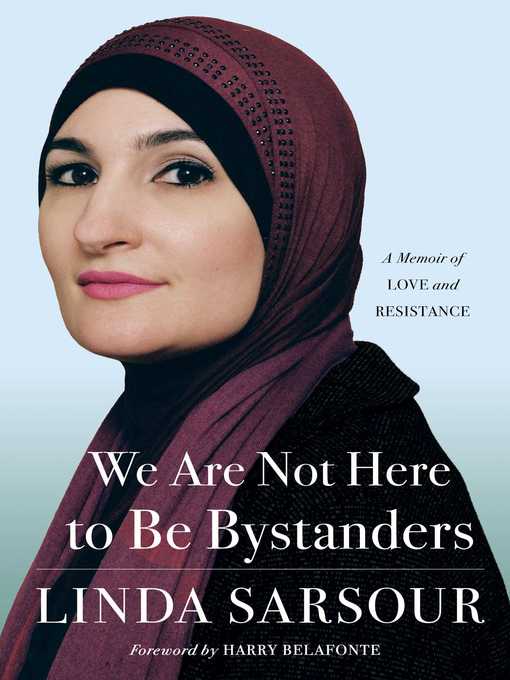
We Are Not Here to Be Bystanders
A Memoir of Love and Resistance
کتاب های مرتبط
- اطلاعات
- نقد و بررسی
- دیدگاه کاربران
نقد و بررسی

October 1, 2019
A Palestinian Muslim American born and raised in Brooklyn, Sarsour learned about multiple richly intersecting communities while working at her father's bodega and became committed to social justice after 9/11. She has since served as national cochair of the Women's March on Washington and as the executive director of the Arab American Association of New York. Here she tells a vivid personal and political story of faith, feminism, and commitment to activism.
Copyright 2019 Library Journal, LLC Used with permission.

November 25, 2019
Civil rights activist Sarsour, cochair of the Women’s March on Washington, seeks to “shatter every stereotype... of Muslim women” in this tough, score-settling narrative. A Palestinian-American girl who gets “a secret thrill” in saying “I’m from Brooklyn. Don’t mess with Brooklyn,” she weds at 17 in an arranged marriage. Pregnant at 19, she starts wearing a hijab, “a visible sign” of “exactly what I was, unapologetically Muslim.” Two years later, on September 11, despite warnings that a hijab is “too dangerous,” she continues to wear hers “to represent the good in Islam, to act in opposition to the evil.” She joins the Arab American Association of New York and fights against the Muslim registry as well as government surveillance of Muslims. Her activist involvement in the Eric Garner and Michael Brown cases and the Black Lives Matter movement elevates her profile, and was asked to help organize the 2017 Women’s March, slated to occur the day after Trump’s inauguration. In addressing post-event accusations “of anti-Semitism, religious fundamentalism (because I wore a hijab)” that were “driven by white women who claimed that we had hijacked their movement,” the tone becomes bitter. Ultimately, Sarsour’s passionate memoir powerfully captures a unifying moment of social protest.

December 15, 2019
A celebrated Muslim American activist's memoir of how she came into her identity as a social justice leader in post-9/11 America. Sarsour, executive director of the Arab American Association in New York, grew up between two worlds: her parents' Palestinian homeland and her native Brooklyn. She embraced both: for the warm ties she formed with relatives and the "brown, Black and beige kids" in a neighborhood that looked "like every nineties portrayal of [Brooklyn] ever seen in a Spike Lee joint." She attended John Jay High School, a "notorious gang farm," where she began to see how her life as a Muslim American was "inextricably interwoven" with the lives of all people of color. When 9/11 took place a few years after she graduated, Sarsour witnessed firsthand the way innocent Muslims suddenly became branded as terrorists. She began working with her father's cousin Basemah, a social justice activist who ran the Arab American Association of New York. The author credits Basemah, who died tragically just four years later, with teaching her to "make waves...stir the pot...raise holy hell" when communities were in trouble. After Basemah's death, Sarsour became involved in the fight to create a ground zero mosque as well as protests against the NYPD's stop-and-frisk policies, which targeted people of color. The author later joined forces with fellow activists Tamika Mallory and Carmen Perez to work on both local and national social justice projects to end racial profiling. The trio organized the Women's March on Washington to protest the election of a racist, misogynistic president. Despite these triumphs, Sarsour discovered that her own heightened visibility made her family a target for "an avalanche of hate" while compromising her role as a mother. Candid and poignant, this book offers an intimate portrait of a committed activist while emphasizing the need for more Americans to work against the deep-seated inequalities that still haunt the country. A powerful memoir from a dedicated fighter for social justice.
COPYRIGHT(2019) Kirkus Reviews, ALL RIGHTS RESERVED.

February 1, 2020
In this unforgettable memoir, Women's March co-organizer Sarsour paints a vivid portrait of her life as an activist. Born to Palestinian parents and raised in Sunset Park, Brooklyn, Sarsour grew up proud of her roots as a Palestinian American, a Muslim woman, and a New Yorker. She married soon after high school, gave birth to her children, and began working at the Arab American Association of New York (AAANY). The events of 9/11 altered her understanding of Muslim pride, but only propelled her deeper into the fight for justice. The tragic loss of her mentor was the truest test of Sarsour's commitment to social change. Early in her grief, she was named executive director of the AAANY, at just 25 years old. She vowed to carry her mentor's legacy far into the future. Sarsour has since organized with members of the Black Lives Matter movement, cofounded the Justice League of NYC, and co-organized the Women's March on Washington, the largest single-day protest in U.S. history. An incredible, galvanizing story of the power of participation.(Reprinted with permission of Booklist, copyright 2020, American Library Association.)

























دیدگاه کاربران